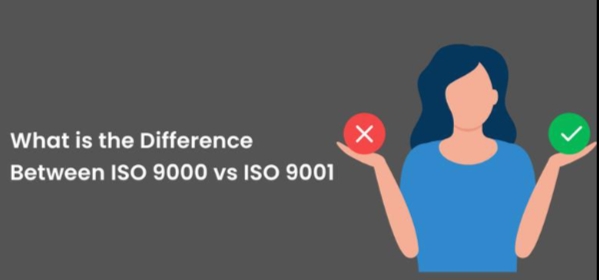In the quality management systems, the International Organization for Standardization (ISO) has developed a set of standards to ensure businesses maintain consistent quality in their products and services. Two widely known standards in this domain are ISO 9000 and ISO 9001. Understanding these two standards’ differences is crucial for organisations seeking to enhance their quality management practices. In this blog, you will learn the difference between ISO 9000 vs 9001 and understand the significance of ISO 9001 Training for businesses.
Table of Contents
- ISO 9000: The Foundation of Quality Management
- ISO 9001: The Certified Standard for Quality Management
- Key Differences between ISO 9000 and ISO 9001
a. Nature and Purpose
b. Certification
c. Focus
d. Applicability
e. Requirements - The Importance of ISO 9001 Training
- Conclusion
ISO 9000: The Foundation of quality management
As many people believe, ISO 9000 is not a certification or a specific standard. Instead, a set of standards creates the framework for efficiently implementing quality management systems. The ISO 9000 series includes standards and best practices to help organizations comprehend the fundamental concepts of quality management. ISO 9000 defines important quality management concepts, provides insights into process interactions, and guides continuous improvement. It is a resource for organizations creating quality management systems based on internationally recognized concepts.
ISO 9001: The Certified Standard for quality management
In contrast, ISO 9001 is a unique and certifiable standard within the ISO 9000 family. While ISO 9000 provides direction and information, ISO 9001 establishes precise standards for organizations that want to show their capacity to consistently produce goods and services that exceed customer expectations while also complying with legal obligations. ISO 9001 provides a framework for organizations to create a complete quality management system that includes activities such as management commitment, resource management, product realization, measurement, analysis, and improvement. ISO 9001 certification demonstrates that a company has effectively built a strong quality management system.
Key Differences between ISO 9000 and ISO 9001
Here are some Key differences between ISO 9000 and ISO 9001
Nature and Purpose
⦁ ISO 9000 is a family of standards providing guidelines and explanations on quality management fundamentals.
⦁ ISO 9001 is a specific standard with precise requirements that organizations must meet to obtain certification.
Certification
⦁ ISO 9000 does not offer certification as it is an informational guide for organizations.
⦁ ISO 9001 is a certifiable standard, and organisations can seek certification through accredited certification bodies.
Focus
⦁ ISO 9000 focuses on providing a solid understanding of quality management principles and terminology.
⦁ ISO 9001 focuses on establishing a robust quality management system with a customer-centric approach.
Applicability
⦁ ISO 9000 is relevant to any organization, regardless of size, industry, or location, as it offers general guidance.
⦁ ISO 9001 applies to organizations seeking formal certification for their quality management system and is often required or preferred in business contracts.
Requirements
⦁ ISO 9000 has no specific requirements; it serves as a set of guidelines to assist organizations in improving their quality management practices.
⦁ ISO 9001 sets out specific requirements organizations must meet, including documentation, process control, and continual improvement.
The Importance of ISO 9001 Training
Obtaining ISO 9001 certification necessitates a thorough understanding of the standard’s criteria and best practices for quality management. Organizations that want to develop an effective quality management system and gain certification must invest in ISO 9001 training.
Employees at all levels are empowered by training to properly comprehend the standard, effectively apply its principles, and contribute to the ongoing development of the organization’s operations. Furthermore, ISO 9001 training provides organizations the required experience to confidently manage audits and assessments, resulting in a speedier certification process.
Implementing ISO 9001 and gaining certification is more than simply a tick-box exercise; it symbolizes a dedication to quality and client happiness. ISO 9001 training is critical in this journey since it provides employees and management with the required skills and information.
- Understanding ISO 9001 requirements: ISO 9001 training provides a comprehensive overview of the standard’s requirements, ensuring that everyone in the organization understands what is expected. This includes establishing a quality policy, defining quality objectives, conducting management reviews, and consistently meeting customer requirements. By grasping the essence of ISO 9001, employees can align their actions with the organization’s quality objectives, thus fostering a shared sense of purpose.
- Implementing best practices: ISO 9001 training goes beyond mere theoretical knowledge; it delves into practical implementation strategies. Employees learn to identify and document processes, create quality manuals, and develop effective procedures to ensure standard compliance. With these best practices, the organization can streamline its operations, minimize errors, and deliver products and services that consistently meet customer expectations.
- Encouraging employee involvement: A successful quality management system relies on the active participation of all employees. ISO 9001 training instils a sense of ownership and responsibility among employees by highlighting their role in maintaining quality standards. Employees who feel valued and empowered to contribute to quality improvements become more engaged and committed to the organization’s success.
- Driving continuous improvement: Continuous improvement lies at the core of ISO 9001. Through training, employees learn how to identify areas for improvement, collect and analyse data, and implement corrective and preventive actions. This fosters a culture of ongoing enhancement, where everyone is encouraged to seek better ways of working and strive for excellence in their respective roles.
Conclusion
In the area of quality management, ISO 9000 and ISO 9001 are two interrelated but different components. While ISO 9000 provides helpful information on quality management concepts and foundations, ISO 9001 establishes precise standards for organizations seeking official certification. ISO 9001 certification may improve an organization’s reputation, customer happiness, and efficiency. Organizations must engage in thorough ISO 9001 training for their personnel to effectively travel the route to ISO 9001 certification, creating a quality and continuous development culture.













